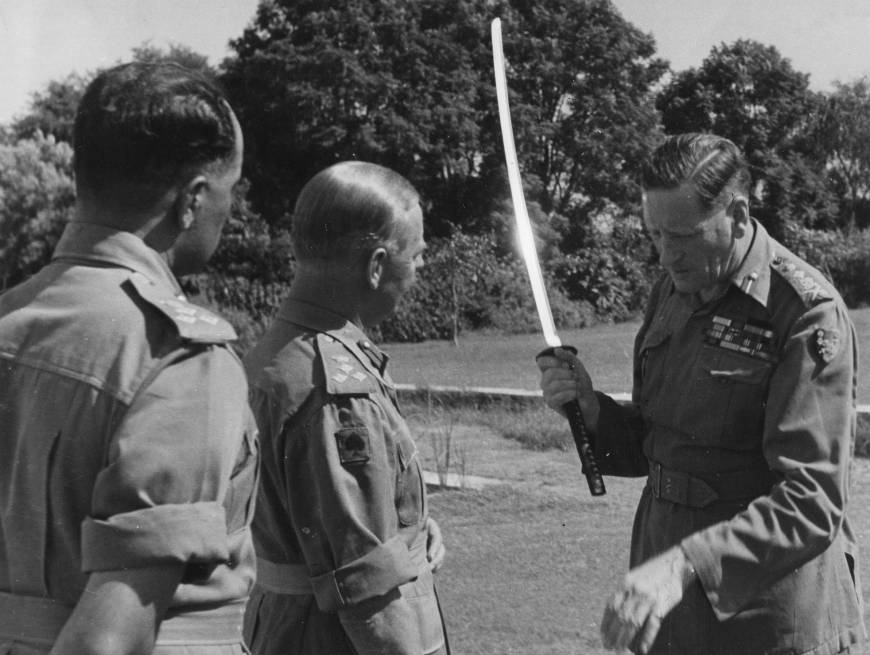Welcome to DU!
The truly grassroots left-of-center political community where regular people, not algorithms, drive the discussions and set the standards.
Join the community:
Create a free account
Support DU (and get rid of ads!):
Become a Star Member
Latest Breaking News
General Discussion
The DU Lounge
All Forums
Issue Forums
Culture Forums
Alliance Forums
Region Forums
Support Forums
Help & Search
Asian Group
Related: About this forumBushido: The samurai code goes to war

Bushido embodied: Gen. Claude Auchinleck holds up a sword captured in battle during World War II. | CHRIS TURNER VIA FLICKR / CC BY 2.0
by Damian Flanagan
Special To The Japan Times
In a scene from the 1957 film “The Bridge on the River Kwai,” a haughty British Col. in a prisoner-of-war camp confronts the camp’s Japanese commandant. Citing the Geneva Convention as justification, he argues that his officers should not be forced into manual labor, which makes the commandant furious — he declares that he does not abide by Western laws; he adheres only to “Bushido,” the samurai code.
When Bushido first entered the world’s consciousness in 1900, with the publication of Nitobe Inazo’s “Bushido: The Soul of Japan,” it was viewed as an admirable code of chivalry. Its focus on a dedication to duty inspired people around the world, including Robert Baden-Powell’s Scout Movement. But by the 1940s, “Bushido” had become a byword for Japan’s suicidal tendencies and military cruelty.
Today, some connotations have shifted and some have remained the same. Bushido evokes a bygone age of honorable samurai, but also embodies the enduring notion that Japanese have a unique set of values distinct from the West’s. This line of thinking is part of the reason why nationalist groups in Japan are calling for revision to the current Constitution, issued during the U.S. Occupation of 1945 -52.
Perverse theories of Bushido dominated Japanese intellectual life from 1930-45 — eventually inspiring Kamikaze pilots to compose samurai-style death poems and take swords into the cockpit with them — but this was by no means inevitable. Though it initially flowered during the late Meiji Era (1868-1912), the popularity of Bushido in intellectual discourse faded after the death of Emperor Meiji in 1912. His successor, Emperor Taisho, who reigned from 1912 to 1926, suffered from serious physical and psychological ailments and did not inspire the same feverish devotion from his subjects as his father, offering a setback to Emperor-worshipping theories of Bushido. Furthermore, as World War I began, the threat to Japan from European nations receded and the Japanese economy boomed.
Yet this contrast between Japanese and Western values is very often a false one. One of the many brilliant ironies highlighted by “The Bridge on the River Kwai” is that the British Col. does not really care about the Geneva Convention for its preservation of universal human rights, but as a justification for the privileges of the class system. Meanwhile, the Japanese camp commandant reveres Bushido, a code originally designed to protect the privileges of the elite samurai class over the oppressed general populace. In other words, both men cling to anachronistic notions of privilege.
http://www.japantimes.co.jp/culture/2016/07/23/books/bushido-samurai-code-goes-war/
InfoView thread info, including edit history
TrashPut this thread in your Trash Can (My DU » Trash Can)
BookmarkAdd this thread to your Bookmarks (My DU » Bookmarks)
1 replies, 1545 views
ShareGet links to this post and/or share on social media
AlertAlert this post for a rule violation
PowersThere are no powers you can use on this post
EditCannot edit other people's posts
ReplyReply to this post
EditCannot edit other people's posts
Rec (4)
ReplyReply to this post
1 replies
 = new reply since forum marked as read
Highlight:
NoneDon't highlight anything
5 newestHighlight 5 most recent replies
= new reply since forum marked as read
Highlight:
NoneDon't highlight anything
5 newestHighlight 5 most recent replies
Bushido: The samurai code goes to war (Original Post)
yuiyoshida
Jul 2016
OP
Old Crow
(2,212 posts)1. Very interesting article; thanks for posting this.
A few random comments:
1. I was fascinated to learn that America's Boy Scouts were inspired, largely, by the Bushido code.
2. The seminal text on Bushido was written by Inazo Nitobe in English right here in Pennsylvania, more or less in my neighborhood. Who knew? ![]()
3. The Bushido code has an enthralling, almost mesmerizing character to it. I think the author of this article correctly suggests that the code led to a fervor among the Japanese populace in the Second World War that the Americans found alarming and that helped Americans rationalize the use of the atomic bombs.
4. Bushido: The Soul of Japan is now on my Goodreads "To Read" list; I hope to get to it soon.
Thanks again, Yui!